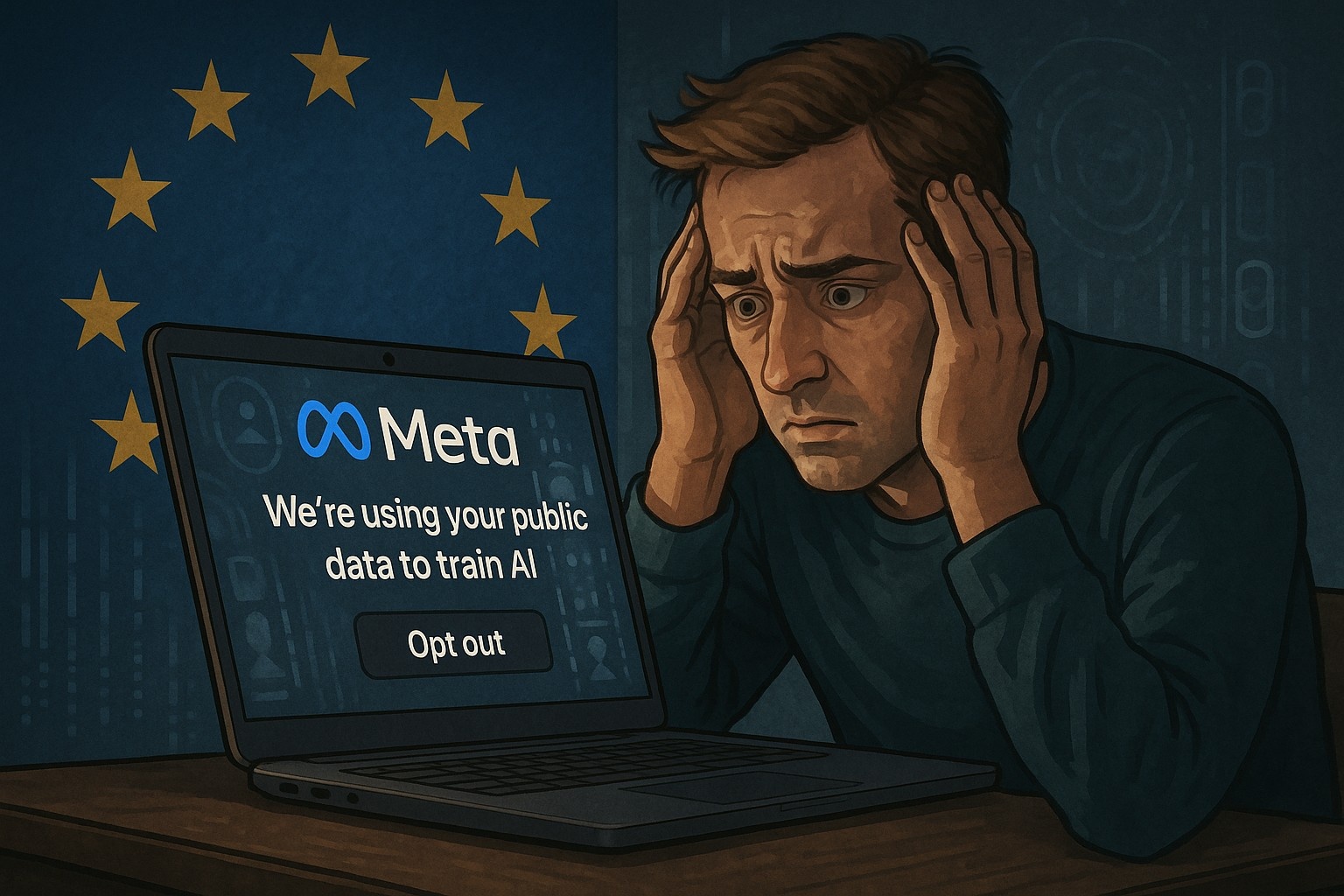Meta Wants Your Data for Its AI (Again!) – EU Users Brace for a New Privacy Showdown
Just when you thought the whole “Big Tech vs. Your Privacy” debate had peaked, here comes another curveball from Meta—the company that owns Facebook, Instagram, and WhatsApp. If you’re an EU citizen, you might want to sit down for this.
As of May 16, 2025, privacy watchdogs across Europe are raising red flags over Meta’s latest move: the company plans to start using public user data from EU accounts to train its artificial intelligence models— without asking for explicit consent.
The kicker? It’s supposed to begin as early as May 27. That’s right—your posts, comments, captions, and photos might be on their way into Meta’s AI engines unless you manually opt out.
Austrian privacy advocacy group noyb (None of Your Business), led by activist Max Schrems, is calling this “textbook illegal” and is already threatening legal action, claiming it violates the GDPR—the European Union’s strict data protection law.
It’s shaping up to be yet another classic showdown: Meta’s corporate ambition vs. the EU’s commitment to digital rights. Let’s break down what’s happening, why it matters, and how it might affect your data (and your digital future).
🔍What Exactly Is Meta Planning?
According to Meta’s updated privacy policy notices, the company intends to begin using “publicly shared content” by EU users on Facebook and Instagram to train its next-generation AI models.
That could include:
- Photo captions
- Public comments
- Public posts
- Replies in group discussions
- User-generated images (in public mode)
Meta’s rationale? It claims it has a “legitimate interest” in using this data to improve its AI systems—for better content recommendations, smarter virtual assistants, more personalized ads, and generative features like AI image editing or automated messaging.
But there's a catch: users are not being asked to explicitly opt in. Instead, Meta has implemented an opt-out mechanism that’s being criticized for being difficult to find and confusing to use.
⚖️What Is noyb Saying—and Why Are They Furious?
Enter noyb, the privacy advocacy group that’s basically the EU’s watchdog pitbull for digital rights.
They’re not having any of this.
Here’s what noyb argues:
- GDPR requires explicit consent for the use of personal data in AI training unless there’s a clear lawful basis—and "legitimate interest" doesn’t cut it for something this broad.
- Users are not given real, informed control over how their data is used.
- The opt-out process is intentionally vague and places the burden unfairly on the user.
- Meta has a history of pushing legal boundaries and only backing down under enforcement pressure.
Max Schrems, founder of noyb, bluntly stated:
“Meta is trying to pretend that this massive data grab is a normal thing, when it’s clearly not. It’s an abuse of the ‘legitimate interest’ clause, and it puts AI development over fundamental rights.”
noyb has already submitted formal complaints to 11 EU data protection authorities, including those in France, Germany, Italy, and the Netherlands.
🧠How Will Meta Use This Data for AI?
Meta hasn’t provided exact details, but based on its AI initiatives to date, your data could be used for:
- Training generative AI models like text or image creators, similar to OpenAI’s ChatGPT or Google’s Gemini.
- Improving recommendation systems for reels, posts, or ads.
- Training chatbots or virtual assistants to better “understand” human conversation.
- Enhancing AI-based content moderation by studying patterns in public posts and comments.
This means your online expressions, even something as casual as a “love this!” comment on a cake recipe, could end up being part of the next Meta AI engine—without you ever knowing it.
🔄Legitimate Interest vs. Explicit Consent: The Legal Tension
Here’s where the real battleground lies.
What is “legitimate interest”?
Under Article 6(1)(f) of the GDPR, companies can process personal data if they have a legitimate interest and if that interest doesn’t override the rights and freedoms of users.
Meta is claiming that:
“The development of AI systems is necessary for providing better services and experiences, which constitutes a legitimate interest.”
But privacy experts are saying:
- AI model training involves large-scale data processing, which is far beyond typical personalization or analytics.
- The data being used is not anonymous—even public posts can contain personal opinions, health info, or sensitive data.
- Users are not properly informed about how their data is being used, and many don’t even know they need to opt out.
In short, critics argue that Meta’s interpretation of “legitimate interest” is dangerously broad—and could set a precedent for companies to harvest personal content for AI under vague legal terms.
🧾Is the Opt-Out Easy or Buried?
That’s another major point of contention.
While Meta claims users can “easily” opt out via a privacy settings page, noyb and others point out:
- The option is buried deep within account settings.
- It’s written in vague legal language that doesn’t clearly explain the consequences.
- There is no single-click, universal opt-out.
- Once you opt out, there’s no confirmation of what data has already been used.
So even if you manage to find the opt-out, you’re left wondering: Has my data already been fed to the machine?
🌍Why This Story Is Bigger Than Just Meta or the EU
This is not the first time Meta has found itself in hot water over data collection—and it won’t be the last. But this case matters because:
- It challenges how AI systems are being trained globally.
If companies can use your public content without consent, where does the line stop? - It tests the strength of GDPR enforcement.
If regulators allow this, it opens the door for similar “opt-out-by-default” practices across Europe. - It impacts millions of users.
From casual Facebook users to small businesses using Instagram, this could affect how your content is stored, used, and even sold.
And it sets a precedent: Are we, as internet users, the unpaid fuel for commercial AI models?
🤔Ethical Questions: Is Public Content Really Fair Game?
Meta’s main defense is that the data they’re using is “publicly shared.”
But public doesn’t mean permissionless.
Just because someone posts a picture of their pet cat or shares a thought about anxiety doesn’t mean they’re OK with that data being:
- Used to train chatbots
- Sold in ads
- Stored in AI memory banks for years
The ethical issue is simple: Should users have a clear, empowered say in how their digital expressions are used?
Right now, the control seems to lie more with tech giants than with individuals. And that’s a balance many privacy advocates want to flip.
⏳What Happens Next?
As of now:
- noyb’s complaints are under review by data regulators in at least 11 EU countries.
- Meta has not paused its data collection plans (as of May 17).
- The EU could issue emergency orders or injunctions if enough evidence of GDPR breach is found.
- A potential court battle may take months—or years—but could lead to heavy fines or restrictions.
Remember: Meta already faces multiple GDPR penalties, including a €1.2 billion fine in 2023 for data transfer violations. So the tension is real.
🔐What You Can Do as a User
If you’re in the EU (or want to act preemptively elsewhere), here’s what you can do:
- Review your privacy settings on Facebook and Instagram.
- Search for the AI data opt-out form—Meta is legally required to provide it.
- Make your posts private or “friends only” if you don’t want them used in training.
- Stay informed—follow privacy advocacy groups like noyb.org for updates.
- Advocate for clear, consent-first data use—whether it’s Meta or any AI company.
🧠Final Thoughts: Who Owns Your Digital Self?
Meta’s AI ambitions are nothing new. But the difference now is that you may be the raw material.
Your words. Your ideas. Your pictures. Your emotions.
This isn’t just about convenience or better filters—it’s about control. And whether we, as individuals, get to decide how our digital lives are used, learned from, or monetized.
Because AI might be the future—but your data? That’s yours. And it’s worth fighting for.














